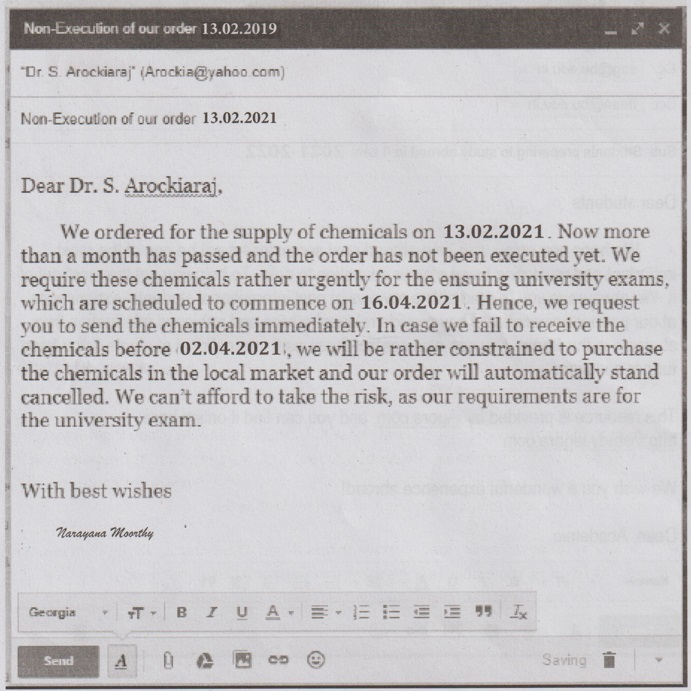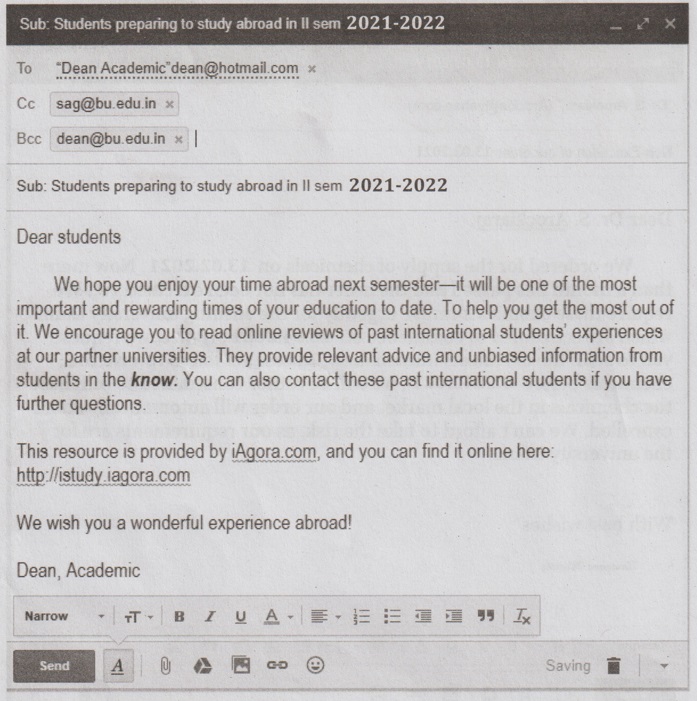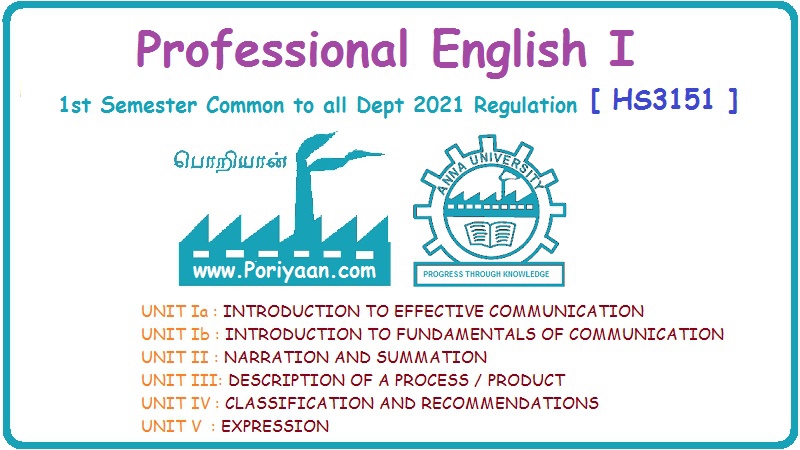Professional English I: Skill 4: Introduction to Effective Communication: Writing
Writing Emails / Messages
Professional English
Emails are widely used not only for academic and business communication but also for personal exchanges because of their speed and convenience.
Topic – 1 WRITING EMAILS / MESSAGES INTRODUCTION Emails are widely used not only for academic and business communication but also for personal exchanges because of their speed and convenience. The inbuilt format of an email letter includes the following lines that the sender must fill in before sending it off. To: This is for the email address of the recipient; more than one address can be written, separated by commas. Cc (carbon copy, or copy to): This is for a list of addresses to which you want to send copies of your message. Bcc (blind carbon copy): Recipients' addresses typed here will not be seen by other recipients. Use this if you do not want the person /people to whom you are writing to know who you are keeping informed. It also protects the privacy of people who may not want to reveal their email address. In personal emails we usually do not use this field. Subject: This tells the recipient what the email is about. In a personal mail you may just write 'Hello' or something personal like 'Remember me?? The subject line must be clear and specific so that the recipient gets an idea of its content even before reading your letter. The subject line also helps recipients' later search for and find particular messages. Attachments: These are files which go with your message that the recipient will download to read or see. Note that the email address of the sender and the date (and time) appear automatically when an email sent, but in many formal emails, they are also included in the letter. Here are some important points to remember when writing email messages. ✓ The tone you use should be appropriate to the relation you have with the recipient of your message. When you write to close friends, using informal or even casual language is acceptable. But when you are writing a formal email letter on a work-related matter, use language that is appropriate for its subject. ✓ Make the message easy to read. If there are many points in your email letter, say so at the beginning of your message. Otherwise, the reader may see something that interests him/ her halfway down the message and hit the reply button to write back to you. ✓ Avoid writing long messages. Many people get larger numbers of email messages and will try to rush through them. They may pass on to the next message if yours is too long. ✓ Send attachments only if necessary. Attachments that have graphics or photographs can take a long time to download. They can carry viruses or be incompatible with the software of the recipients computer. Be considerate of the recipient's circumstances (access and affordability of bandwidth). ✓ Typing the whole message in capital letters is considered to be a rude act, known as “flaming' and is the equivalent of shouting; it will offend the recipient. ✓ Even though a personal email can only be seen by the recipient, be aware that messages can easily be shared or forwarded. Be cautious about what you write and think twice whether you want to put your thoughts down in writing, especially when you are annoyed. Do not use email messages to attack someone or to vent your anger. ✓ Do not write anything in your message that is illegal or unethical. Though email affords privacy to users, remember that anything that you send can be retrieved by hackers, your employers, government investigating agencies and even criminals. Look at the samples e-mail below, Sample Email message: 1 Sample Email message: 2 Sample Email message : 3 I. Write the following e-mails, inventing suitable Ids. 1. Imagine yourself to be the instructor of a course in which 75 students have registered. Draft an e-mail to be sent to all these students asking them to select a topic of their choice and prepare for a professional presentation of 10 minutes duration. 2. As the Sales Manager of a company, draft a reply which has to be sent in the form of an e-mail to three customers who have complained about your product. Invent necessary details. 3. Assume that you are Niren Bhattacharya, a student doing B.Tech in Mechanical Engineering from IIT, Delhi. Write an e-mail message to Kabir Sahini, the Personal Manager of Alpha Industries requesting him to allow you to do summer training at the Gurgaon Plant of the company. Tell him that you need to do a two weeks training at some company as part of your academic assignments. 4. Suppose you want to take an education loan from Citi Bank. Write an e-mail for the Credit Manager of Citi Bank, Mumbai requesting him to send you details regarding educational loans by Citi Bank. 5. Assume that you have to write an e-mail to Librarian in-charge of the central library of your university requesting him to send you information regarding new arrivals in the library through e-mail. 6. You are Sunil Mehta, Purchase Officer, Central Mining Research Institute, Nagpur. Write an e-mail to the Sales Manager of HCL Limited, Kolkata office. You want fifty HCL Desktop computers at the quoted price of Rs. 21,327/- each. Request the Sales Manager to send details regarding payment system, freight and handling charges, and the delivery time. 7. Assume that you are the Managing Director of a company dealing with electronic equipment. Inform all your employees about the new community hall which the company is going to inaugurate next week. Highlight the important features of both the hall and the inauguration. 8. As the Personnel Manager of a multinational firm, draft an e-mail to be sent to those candidates who were not selected in the interview conducted few days before. Take care not to be courteous and sympathetic while conveying the negative message. 9. Write e-mail to your friend condoling him on the death of his grandfather. 10. Write e-mail to your elder brother in the states requesting him to send a few latest books on computer, which are not available in our country.


Practice Exercises
Professional English I: Skill 4: Introduction to Effective Communication: Writing : Tag: : Professional English - Writing Emails / Messages
Related Topics
Related Subjects
Professional English I
HS3151 1st semester | 2021 Regulation | 1st Semester Common to all Dept 2021 Regulation
